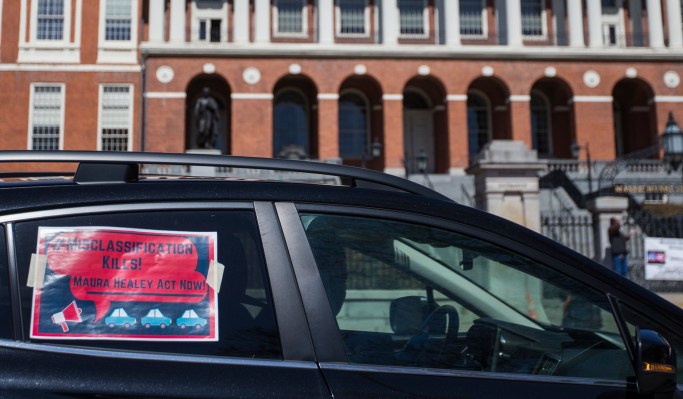Entertainment
Massachusetts court rejects ballot to define gig workers as contractors


In a major setback for app-based gig economy companies like Uber, Lyft and DoorDash, a Massachusetts court ruled on Tuesday to throw out a proposed ballot measure that would, if passed, define gig workers as independent contractors rather than employees.
The Massachusetts Supreme Judicial Court’s unanimous decision found that the ballot initiative violated state law and was therefore ineligible to put to voters this fall. The move, which has ended a $17.8 million campaign by gig companies to support the measure, signifies a major win for labor rights activists who argue that companies have been failing to provide proper worker protections and benefits, like workers’ compensation or even a basic minimum wage. In fact, one study found workers in Massachusetts could earn $4.82 per hour if the measure passed.
The Massachusetts Coalition for Independent Work, the coalition of app-based gig companies that proposed the ballot initiative, did not confirm whether or not it would continue to fight in Massachussetts, but Uber CEO Dara Khosrowshahi has stated multiple times that the company would support and promote similar proposals across the United States. Uber and other companies are actively working to do just that in states like Colorado, Illinois, New Jersey, New York and Washington.
In September 2021, Attorney General Maura Healey gave the coalition the green light to start collecting signatures needed to put the measure before voters, despite having sued Uber and Lyft in the past to challenge their defining of drivers as contractors.
Justice Scott Kafker said on Tuesday that Healey, a Democrat running for governor, was wrong to say the proposal complied with state constitutional requirements limiting ballot measures to related subjects. Kafker said the coalition included a vaguely worded, unrelated proposal to limit companies’ liability for accidents by their drivers. This is a particularly hot topic in the wake of research that has documented at least 50 deaths of gig workers on the job since 2017, with minimal effort from the companies to provide support to families of victims.
The proposed bill mirrors much of California’s Proposition 22, which passed in California in 2020 but has since been ruled unconstitutional and now hangs in legal limbo. It called for establishing an earnings floor equal to 120% of the state minimum wage, or $18 an hour, before tips. Crucially, however, the companies only count the hours when a worker is actively driving to pick up a rider or food and drop the rider or food off — meaning all the time spent driving around, using gas and looking for work goes unpaid.
Per the now-moot ballot measure, the companies would have been required to pay healthcare stipends if drivers work at least 15 hours per week, and drivers would have been eligible for paid sick time and paid family and medical leave.
Flexibility & Benefits for Massachusetts Drivers, the ballot question committee under the coalition, said the court’s ruling subverts “the democratic process and [denies] voters the right to make their own decision.”
A survey of about 400 Massachusetts drivers, paid for by the gig companies, found 81% of workers backed the ballot measure. However, labor activists have argued that due to the vast sums of money gig companies spent on convincing drivers their livelihood and flexibility was at stake, drivers were presented with a false and misleading choice between having flexibility and benefits, both of which could be achieved as employees.
“It’s laughable that these companies would falsely try to position themselves as advancing democracy while in the midst of attempting to spend tens of millions of dollars to buy a deceitful law that would do harm not just to our democracy and communities, but also to taxpayers, drivers, and passengers,” said Wes McEnany, campaign director of the “Massachusetts is not for sale” coalition, in a statement.
-

 Entertainment6 days ago
Entertainment6 days agoWhat’s new to streaming this week? (Jan. 17, 2025)
-

 Entertainment6 days ago
Entertainment6 days agoExplainer: Age-verification bills for porn and social media
-

 Entertainment5 days ago
Entertainment5 days agoIf TikTok is banned in the U.S., this is what it will look like for everyone else
-

 Entertainment5 days ago
Entertainment5 days ago‘Night Call’ review: A bad day on the job makes for a superb action movie
-

 Entertainment5 days ago
Entertainment5 days agoHow ‘Grand Theft Hamlet’ evolved from lockdown escape to Shakespearean success
-

 Entertainment5 days ago
Entertainment5 days ago‘September 5’ review: a blinkered, noncommittal thriller about an Olympic hostage crisis
-

 Entertainment5 days ago
Entertainment5 days ago‘Back in Action’ review: Cameron Diaz and Jamie Foxx team up for Gen X action-comedy
-

 Entertainment5 days ago
Entertainment5 days ago‘One of Them Days’ review: Keke Palmer and SZA are friendship goals




















